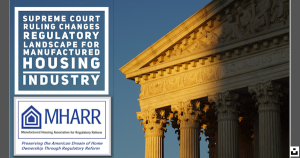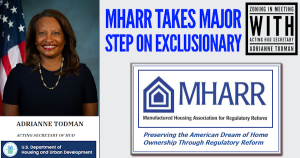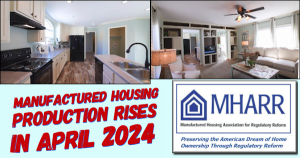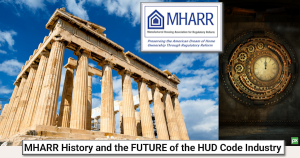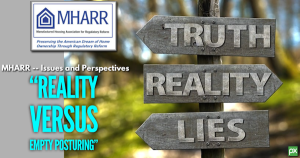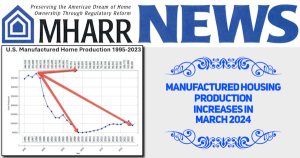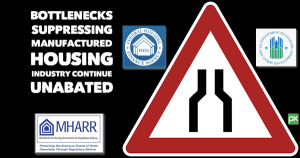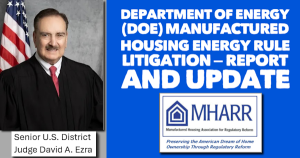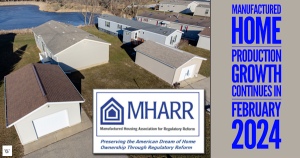Manufactured Housing Association for Regulatory Reform (MHARR) Calls Out DOE Energy Standards Bait and Switch
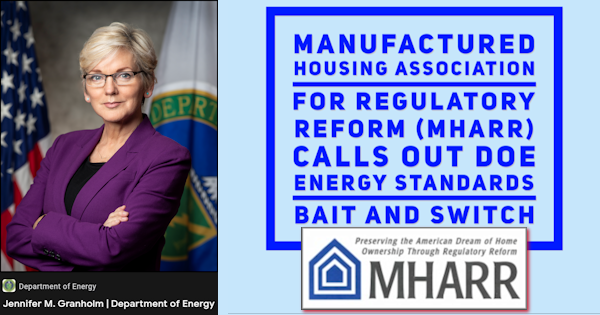
Washington, D.C., May 9, 2022 – The Manufactured Housing Association for Regulatory Reform (MHARR) in a May 4, 2022 communication to U.S. Department of Energy (DOE) Secretary Jennifer Granholm copy attached , has called-out DOE’s duplicity in altering – after the conclusion of any opportunity for public comment – the fundamental nature and cost of its proposed energy conservation standards for manufactured homes.
As presented for public comment, as well as comment and input from HUD’s statutory Manufactured Housing Consensus Committee (MHCC) – during an administrative process that lasted more than six months – DOE characterized its “primary” manufactured housing energy conservation proposal as a “tiered” standard, with an alleged retail purchase price impact “averaging” $750.00.
MHARR warned at the time – in comments filed with the MHCC – that given the structure of DOE’s August 26, 2021 Supplemental Notice of Proposed Rulemaking (SNPR) and DOE’s track record of duplicity over the entire course of the energy standards rulemaking, this was likely a ruse designed to lull stakeholders, HUD and the MHCC into a false sense of complacency. In part, MHARR stated that: “despite all the talk of a ‘tiered’ system, and the use of a tiered proposal to mislead and lure stakeholders, the public and the MHCC into supporting the DOE SNPR, a final rule in this matter could ultimately have no separate cost-based ‘tiers’ at all, and subject all manufactured homes to high-cost market-crushing IECC-based energy standards.” (Emphasis added).
And now, of course, DOE has done exactly what MHARR predicted in its September 15, 2021 MHCC comments. Buried in a 400+ page final DOE “Environmental Impact Statement” (EIS) filed in connection with the proposed manufactured housing energy rule, is a statement that after “consideration of public comments received on the draft EIS combined with stakeholder inputs under the rulemaking process, DOE has identified the untiered standards as the preferred alternative….” (Emphasis added). Unlike the “tiered” proposed standards, the “untiered” standards based on the 2021 International Energy Conservation Code (IECC), could result in retail purchase price increases of $2,567.00 to $6,149.00, by DOE’s own admission (and, based on industry input, much more than that) before inflationary impacts and the costs of testing, regulatory compliance, and enforcement – which have never been publicly estimated by DOE, HUD, or anyone else — are even considered.
MHARR’s communication, accordingly, refers to this de facto “bait and switch” after the conclusion of the public comment period for the proposed rule, as “wholly reprehensible and yet further evidence of DOE’s ongoing bad faith and misconduct in this matter.”
MHARR will continue to aggressively oppose the deceitful and unnecessary DOE energy rule which will impose harsh and needless cost burdens on lower and moderate-income Americans and further increase homelessness and the debilitating shortage of affordable housing and homeownership, contrary to the stated policies of President Biden. This effort will include both administrative steps and potential industry legal action.
The Manufactured Housing Association for Regulatory Reform is a Washington, D.C.-based national trade association representing the views and interests of independent producers of federally-regulated manufactured housing.
attachment

Washington, D.C., May 9, 2022 – The Manufactured Housing Association for Regulatory Reform (MHARR) in a May 4, 2022 communication to U.S. Department of Energy (DOE) Secretary Jennifer Granholm copy attached , has called-out DOE’s duplicity in altering – after the conclusion of any opportunity for public comment – the fundamental nature and cost of its proposed energy conservation standards for manufactured homes.
As presented for public comment, as well as comment and input from HUD’s statutory Manufactured Housing Consensus Committee (MHCC) – during an administrative process that lasted more than six months – DOE characterized its “primary” manufactured housing energy conservation proposal as a “tiered” standard, with an alleged retail purchase price impact “averaging” $750.00.
MHARR warned at the time – in comments filed with the MHCC – that given the structure of DOE’s August 26, 2021 Supplemental Notice of Proposed Rulemaking (SNPR) and DOE’s track record of duplicity over the entire course of the energy standards rulemaking, this was likely a ruse designed to lull stakeholders, HUD and the MHCC into a false sense of complacency. In part, MHARR stated that: “despite all the talk of a ‘tiered’ system, and the use of a tiered proposal to mislead and lure stakeholders, the public and the MHCC into supporting the DOE SNPR, a final rule in this matter could ultimately have no separate cost-based ‘tiers’ at all, and subject all manufactured homes to high-cost market-crushing IECC-based energy standards.” (Emphasis added).
And now, of course, DOE has done exactly what MHARR predicted in its September 15, 2021 MHCC comments. Buried in a 400+ page final DOE “Environmental Impact Statement” (EIS) filed in connection with the proposed manufactured housing energy rule, is a statement that after “consideration of public comments received on the draft EIS combined with stakeholder inputs under the rulemaking process, DOE has identified the untiered standards as the preferred alternative….” (Emphasis added). Unlike the “tiered” proposed standards, the “untiered” standards based on the 2021 International Energy Conservation Code (IECC), could result in retail purchase price increases of $2,567.00 to $6,149.00, by DOE’s own admission (and, based on industry input, much more than that) before inflationary impacts and the costs of testing, regulatory compliance, and enforcement – which have never been publicly estimated by DOE, HUD, or anyone else — are even considered.
MHARR’s communication, accordingly, refers to this de facto “bait and switch” after the conclusion of the public comment period for the proposed rule, as “wholly reprehensible and yet further evidence of DOE’s ongoing bad faith and misconduct in this matter.”
MHARR will continue to aggressively oppose the deceitful and unnecessary DOE energy rule which will impose harsh and needless cost burdens on lower and moderate-income Americans and further increase homelessness and the debilitating shortage of affordable housing and homeownership, contrary to the stated policies of President Biden. This effort will include both administrative steps and potential industry legal action.
The Manufactured Housing Association for Regulatory Reform is a Washington, D.C.-based national trade association representing the views and interests of independent producers of federally-regulated manufactured housing.
attachment




